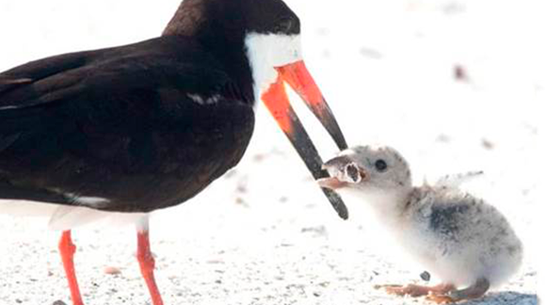
Cigarette butts pollute the oceans and are consumed by animals
Animal life photographer Karen Mason on a beach in Florida, United States, captured the shocking scene above a bird feeding her cub with a cigarette filter. According to experts, it is common for birds to confuse cigarette butts with food. According to report from BBC Brazil website, the Royal Society for the Protection of Birds, from United Kingdom, described the image as "painful."
On this Smoke Fight Day, photography is ideal for alerting to a serious problem affecting the whole world: the pollution of nature through cigarette butts. Butts or stubs, as they are known, are the most common item of waste collected on beaches around the world, according to environmental conservation organizations. That is, cigarettes, not plastics, are the real pollutant of beaches, more than plastic bags, straws, bottles and other waste. According to the NGO Ocean Conservancy, which has been working on beach cleaning for 32 years, over 60 million stubs were found on the coast during this period. This is equivalent to one third of all the waste collected in the world on beaches.
STUBS TAKE 10 YEARS TO DECOMPOSE
It is estimated that 5.6 trillion cigarettes are manufactured annually worldwide. Most contain a filter made of cellulose acetate, a plastic material that can take 10 years to decompose. When they disintegrate, they form micro plastics that are easily consumed by animals living at sea. Researchers found debris in 70% of seabirds and 30% of sea turtles.
If the appeal to care for nature does not make smokers sensitive, there are enough arguments to rethink the habit when it comes to human health. According to the World Health Organization (WHO), the tobacco kills over 7 million people per year, about half of the users for diseases such as cancer and diabetes. Over 6 million of these deaths are the result of direct tobacco use, while about 890 thousand are non-smokers exposed to secondhand smoke. And the financial losses are equally alarming: smoking accounts for more than U$1.4 trillion (around R$5 trillion) in healthcare costs and lost productivity in the world.
ShP - Certificado Laranja
SMOKING KILLS 54 THOUSAND CHILDREN A YEAR
Secondhand smoking is related to several diseases in children, such as asthma, bronchitis, pneumonia, and acute and chronic otitis, as well as Sudden Childhood Death Syndrome. Secondhand smoking worldwide causes 54 thousand deaths in children ages 0 to 4, according to the National Cancer Institute (Instituto Nacional do Câncer). Inca also considers smoking a pediatric disease, as 80% of people start smoking before 18 years old. In Brazil, 20% of smokers started the habit before 15 years old.
In Brazil, 428 people die each day from nicotine addiction. It is as if all employees of a large company die each day from smoking. The victims suffer mainly from cancer, heart disease and lung disease.
On the other hand, the law that prohibits smoking in public places in Brazil had very positive effects, according to Inca. The institute estimates that restricting smoking in these places prevented 15 thousand child deaths in Brazil from 2000 to 2016. This is because before the law of free places, the little ones were much more exposed because they inhaled cigarette smoke in malls, supermarkets, party rooms, public transport, restaurants etc.
BUTT TURNING TREE
As a way to mitigate the pollution problem, Indian Prasadam Industries produces biodegradable filters. The Karma Filter is made from 100% organic, biodegradable and chemical free material, according to the Indian company. And the filters have seeds, which become plants when discarded. If cigarette butts are thrown in a place that contains land, there are big chances that the seeds will germinate.
FREE QUIT SMOKING TREATMENT
The good news is that the Unified Health System offers free treatment for those who want to quit smoking. On Inca´s page about the National Tobacco Control Program in the states it´s possible to get information about the places where the treatment is offered.
In addition, the National Cancer Institute gives some tips for those who want to quit the addiction. Learn more on https://www.inca.gov.br/como-parar-de-fumar.
News
2025-04-25
Ilumina Social: Instituto Neoenergia lança pela primeira vez edital com foco em saúde e bem-estar
2025-04-22
Neoenergia vende 50% de Itabapoana Transmissão
2025-04-15
Nova campanha da Neoenergia celebra a potência feminina no esporte e reforça apoio às atletas embaixadoras da marca
2025-03-27
Instituto Neoenergia lança chamada inédita unificada de editais para apoiar projetos sociais
2025-03-21
